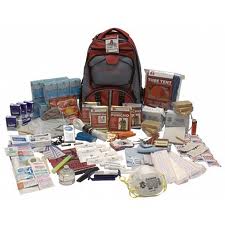Related Posts

Hurricanes are dangerous and if one is approaching where you live you should always try to get out of its way. No house, car, or anything you own is worth your life, that’s why there’s insurance to protect those things. That being said every year people decide to wait it out. Like earthquakes, tornadoes, or other natural disasters knowing how to be prepared for a hurricane if you live or visiting an area that’s prone to them is vital for your survival. Here’s a list of 5 ways you can prepare yourself for a hurricane.
1. Keep the tank full
When hurricane season starts it’s always a good idea to keep your gas tank at least half full at all times, there’s a few reasons for this. The first being is that you might be forced to evacuate your home and your not going to get very far if your car has a gas tank that’s almost empty. The second is that as a storm gets closer to a community people start to panic because they never took the time to prepare before and try to get fuel at the last minute. This means long line ups, in some cases 5 hours or longer only to find out that gas station ran out.
2. Stock up on supplies
It could be several days or even weeks before relief aid reaches you. Many forget that the roads will be flooded and full of debris. There’s going to be downed power lines creating electrical hazards, plus the scattered wreckage of buildings and cars everywhere. It’s going to be a full time job just clearing routes for emergency responders, so have enough on hand to get you through it. Some of the things you’ll need are
a. Enough non perishable food to last a couple weeks. This can be canned, dehydrated, or any food that won’t spoil if left at room temperature. You can extend your supplies by using your perishable food first.
b. Water, don’t rely on any water you see sitting in your home or on the street. It’s going to be mixed with sewage, chemicals, and all sorts of other nasty things. So unless you’re 100% percent confident that you can filter and purify that water, make sure you have enough stored away.
c. First aid kit. Chances are good you’ll get injured and infection is a very real danger. Make sure your first aid kit is fully stocked and have at least a basic level of first aid training.
Also if you’re currently taking any medications make sure you have enough for yourself and anyone in your family (including pets if you have any)
Other items you should have are
d. Toiletries
e. Radio
f. Batteries
g. Flashlight
h. Extra clothes, especially socks to keep your feet as dry as possible. You should also have some kind of water repellent rain gear.
i. Extra cash
3. Prepare your home
If you don’t have hurricane shutters you should at least have some pre cut pieces of plywood that fit over your windows. You can also tape them, though this won’t prevent them from braking, it will help reduce the amount of flying glass. Remember when the storm does arrive to find a safe room as far away from the windows as possible and on the main level.
Also if you have a yard make sure that any loose items are put away so they don’t become a flying object. A category 5 hurricane for example will have wind speeds over 150 mph, that’s enough power to easily rip the roof off most houses and buildings and turn little Timmy’s tricycle that you left in the front yard into a dangerous weapon. Also trees or shrubs surrounding your home should also be trimmed to keep the amount of potential debris to a minimum.
4. Have a plan
You’re not on some Special Forces mission in the middle of nowhere, keep it simple and flexible to adapt to any unforeseen changes. Your plan should include an alternative safe location if it’s too risky to stay at home that everyone in your family knows about, and knows how to get to. This is especially important if the storm happens when you’re separated from family members. Everyone in your family should also know the phone number of that location.
You also want to plan for any pets. This does not mean abandoning them. Make arrangements if possible to drop them off in a safe location before the storm. If you’re forced to evacuate to a shelter they won’t take pets.
5. Have the proper insurance
Long before any hurricane hits you should have the proper insurance coverage. As bad as hurricanes can be, you don’t want to make it worse by finding out you not only lost everything, but that your insurance company won‘t cover it. Your insurance should also include flooding, as most disaster policies have this separate. I strongly recommend you read any and all fine print and make sure everything is crystal clear and you know exactly was is and isn’t covered. You can bet if there’s a loophole the insurance company will find a way to not pay you.
Useful Links
Other posts to check out
 Previous Post
Previous PostKnowing how to start a fire without matches is an important skill you need to know. Personally I recommend you never venture into the woods be it a camping or hiking trip without a means to start a fire............

HTML Comment Box is loading comments...




